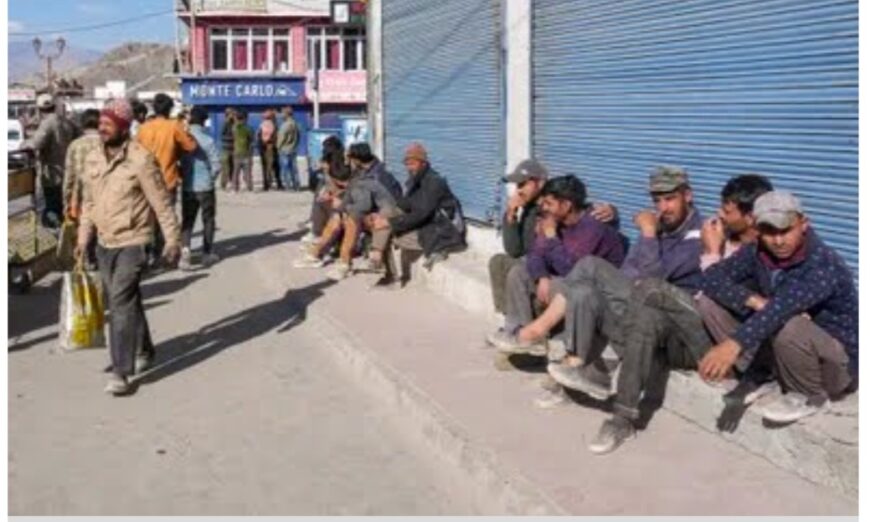In Ladakh, the District Magistrate, Leh has completely withdrawn the restrictions imposed through the prohibitory order under 163 sections of BNSS from the entire Leh district with immediate effect from today.
Section 163 of Bharatiya Nagarik Suraksha Sanhita (BNSS), 2023 has been in place in Leh district since 24 of last month.
The decision of withdrawal has taken this evening today on the recommendations of SSP, Leh about the prevailing peaceful environment and there is no apprehension of breach of peace and public order in the district.
The restrictions had been in place since September 24, after violence erupted during a protest led by climate activist Sonam Wangchuk, who had been on a 35-day hunger strike demanding constitutional safeguards for Ladakh. The incident left four people dead and nearly 100 injured in security forces’ firing.
According to a notification issued by District Magistrate Romil Singh Donk, the restrictions were initially imposed to prevent any breach of peace and disturbance to public order.
However, the Senior Superintendent of Police, Leh, reported that there was no longer any imminent threat and recommended the restrictions be lifted.
“Therefore, I, Romil Singh Donk, IAS, District Magistrate, Leh, do hereby withdraw the restrictions imposed vide this office order endorsement No. JC-69(I)2025 (903) dated 24.09.2025 with immediate effect,” the notification read.
The move comes a day after the Leh Apex Body (LAB) and Kargil Democratic Alliance (KDA)—the two major groups spearheading the ongoing movement—issued a stern warning to the administration.
They announced plans for a two-hour silent march across Ladakh, followed by an evening blackout from 6 pm to 9 pm, in protest against the continued delay in talks with the Centre over fresh demands.
Mobile internet services, which had been suspended after the September 24 unrest, were also recently restored by the administration.
District Magistrate Leh, Romil Singh Donk, issued the formal order revoking the curbs, stating that the situation has remained peaceful for several days with no reports of unrest or breach of public order.
“I do hereby withdraw the restrictions imposed vide this office order dated September 24 with immediate effect,” the District Magistrate said in the order, adding that the initial restrictions were introduced to prevent any disturbance to public tranquillity after violence broke out during the statehood demonstrations.
The decision followed a report from the Senior Superintendent of Police, who confirmed that there was no longer any imminent threat to peace or public safety in the district. “The security review has found the situation under control and stable, warranting the withdrawal of restrictions,” the order stated.
The restrictions were originally imposed after violent clashes erupted on September 22 and 23 between protestors and security personnel during a rally organized by the Leh Apex Body (LAB) and the Kargil Democratic Alliance (KDA).
The agitation, part of a five-year-long campaign demanding statehood for Ladakh and constitutional safeguards under the Sixth Schedule, turned tragic when four civilians lost their lives and over 80 others sustained injuries.
In the aftermath, the police arrested climate activist and education reformer Sonam Wangchuk on September 26, accusing him of inciting violence.
Wangchuk, who has been one of the most visible faces of the statehood movement, was detained under the stringent National Security Act (NSA) and subsequently shifted to Jodhpur jail in Rajasthan.
His detention sparked widespread national debate and drew criticism from human rights activists and opposition parties, who questioned the use of the NSA against a peaceful activist.
Wangchuk’s supporters, under the joint banners of LAB and KDA, had accused the administration of resorting to heavy-handed measures to silence legitimate democratic dissent.
The groups have been demanding not only full statehood for Ladakh but also constitutional protection for its indigenous population, similar to provisions available to other tribal regions in India.
With the restrictions now lifted, public life in Leh began to return to normal on Wednesday. Shops, schools, and offices reopened, while residents cautiously resumed routine activities after weeks of curfew-like conditions.
The administration has maintained that security forces will continue to remain deployed in sensitive areas to ensure that peace is not disturbed.

